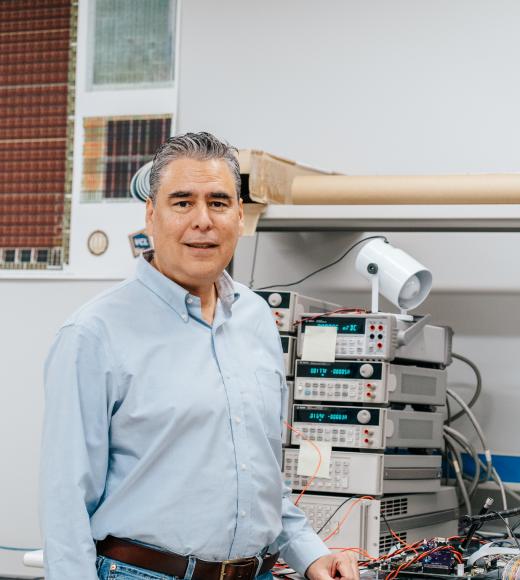
Professor Leads DARPA Project for Ultrafast Processing Chips
Electrical and computer engineering professor Bevan Baas and his team have received $4.9 million from the U.S. Defense Advanced Projects Agency, or DARPA, to develop a chip that will greatly advance radio frequency processing systems such as those used for communications, radar or signal classification.

The in-development chip will be able to process large volumes of data from radio signals in complex electromagnetic environments, such as where numerous wireless signals using different communication standards occupy the same wireless spectrum. In addition, the chip will have the capability of reprogramming itself in under 50 nanoseconds, an ultrafast reaction time never achieved in a chip before, explained Baas.
Baas' team — the VLSI Computation Lab — is one of the few university-based groups designing and fabricating ultrafast programmable and configurable special-purpose processing chips. Over the past decade, three of their processing chips have been among the top five fastest designed in a university.
"My group has a history of developing high-performance and energy-efficient digital signal processing systems and chips and we are thrilled to apply our experience to develop new ideas for the increasingly important field of radio frequency processing systems," Baas said.
One of the key results of this project is a very deep-submicron complementary metal-oxide- semiconductor processing chip, or CMOS. To achieve it, Baas' team will develop novel programmable processors, dedicated-purpose accelerators, specialized memory systems and advanced networks-on-chip.
However, Baas' team isn't working on this chip independently. The VLSI Computation Lab will conceptualize, fabricate and characterize the new processing chip while a team of researchers at California State University, Fresno, collaborates on the physical design of the chip.
Aaron Stillmaker, an associate professor of electrical and computer engineering, leads the Fresno State team. Stillmaker is Baas' former student, earning his master's and doctorate in electrical and computer engineering from UC Davis in 2013 and 2015, respectively.
"Professor Stillmaker is an expert in designing large array processor chips and he is therefore the ideal collaborator to lead the physical design of the DARPA radio-frequency signal processor chip," Baas said. "I am grateful he has agreed to join the project and on a personal level it will be a pleasure to work with him once again."

